To keep your teeth strong, choose snacks rich in calcium, phosphorous, and vitamins like C and D. Crunchy fruits and vegetables like apples, carrots, and leafy greens help clean teeth naturally and boost saliva production. Dairy products such as cheese and yogurt strengthen enamel, while nuts and lean proteins provide essential nutrients for tissue repair. Chewing sugar-free gum can also support oral health. Keep exploring for more tips on healthy snack choices that benefit your smile.
Key Takeaways
- Choose crunchy fruits and vegetables like apples, carrots, and celery to stimulate saliva and reduce plaque buildup.
- Include dairy products such as cheese, yogurt, and milk for calcium, phosphorous, and acid-neutralizing benefits.
- Incorporate nuts and lean proteins like almonds, eggs, and chicken to provide essential minerals for enamel and tissue repair.
- Opt for sugar-free gum containing xylitol to increase saliva flow and inhibit cavity-causing bacteria.
- Limit sugary, sticky, and acidic snacks, and practice proper oral hygiene after indulgent treats to protect tooth enamel.
The Role of Nutrient-Rich Snacks in Dental Health
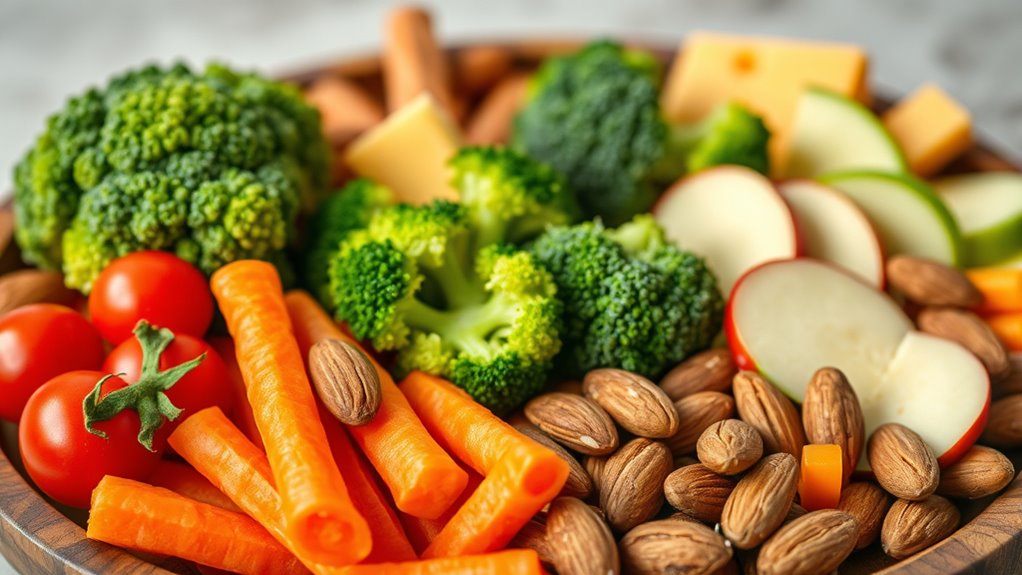
Nutrient-rich snacks play an essential role in maintaining strong and healthy teeth. They provide crucial nutrients like calcium, magnesium, and phosphorus, which strengthen your tooth enamel and bones. These foods also promote saliva production, helping to neutralize acids and wash away food particles that can cause decay.
When you choose snacks like cheese, nuts, or crunchy fruits, you’re supporting your oral health by reducing the risk of cavities and plaque buildup. Plus, snacks high in vitamins, especially vitamin C from oranges and strawberries, keep your gums healthy and prevent periodontal issues.
Incorporating these nutrient-dense options into your diet not only helps repair early tooth decay but also maintains your overall oral integrity, making your smile stronger and healthier.
Fruits and Vegetables That Naturally Clean Teeth
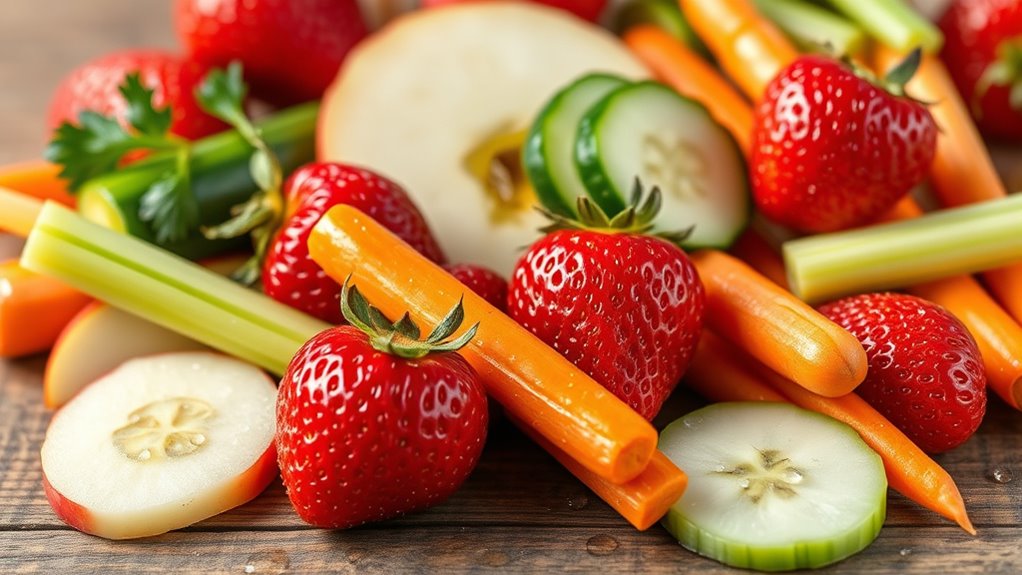
Eating crunchy fruits and vegetables like apples, carrots, and celery naturally helps clean your teeth. These foods stimulate saliva flow, which washes away food particles and neutralizes harmful acids in your mouth. Their fibrous texture acts as a gentle abrasive, reducing plaque buildup and lowering cavity risk. Proper cleaning techniques, such as rinsing after eating, can further enhance these benefits. Apples contain malic acid, which can help whiten teeth and freshen your breath while supporting oral health. Vegetables such as leafy greens are rich in calcium and folic acid, essential for strengthening enamel and maintaining healthy gums. Consuming a variety of fresh, raw produce provides essential nutrients like vitamin C, promoting healthy gums and reducing inflammation. Additionally, proper oral hygiene practices are crucial for maintaining oral health and preventing issues like cavities and gum disease. Incorporating these foods into a balanced diet can contribute to maintaining oral hygiene and overall dental health. Moreover, choosing foods that are naturally abrasive and rich in nutrients supports the strengthening of tooth enamel and promotes healthier teeth over time. Including foods high in bioavailable calcium can further enhance these effects.
Dairy Delights That Strengthen Your Smile
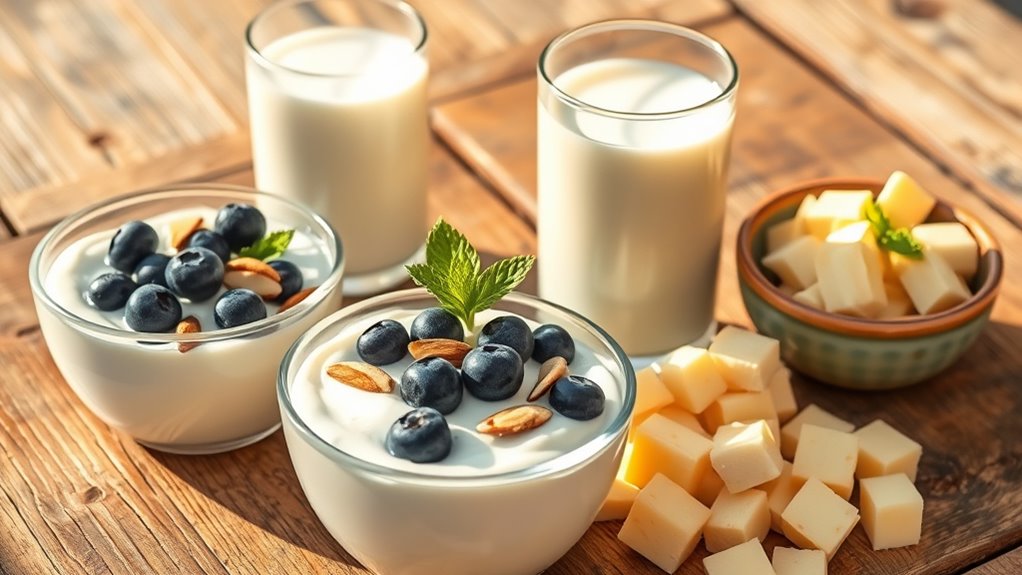
Dairy products like cheese, yogurt, and milk play a key role in strengthening your teeth and maintaining a healthy smile. Rich in calcium and phosphorous, these dairy delights help reinforce your teeth and bones, making them more resistant to decay.
Eating cheese after meals can neutralize harmful acids in your mouth, reducing cavity risk. Yogurt, with its probiotics, promotes healthy oral bacteria balance, supporting gum health and lowering plaque buildup.
Unsweetened dairy alternatives like almond or soy milk provide similar benefits for those sensitive to lactose. Regularly incorporating dairy into your diet increases saliva production, which naturally neutralizes acids and washes away food particles.
This combination of benefits makes dairy products essential for maintaining ideal oral health and a strong, vibrant smile.
The Benefits of Nuts and Lean Proteins for Teeth and Gums
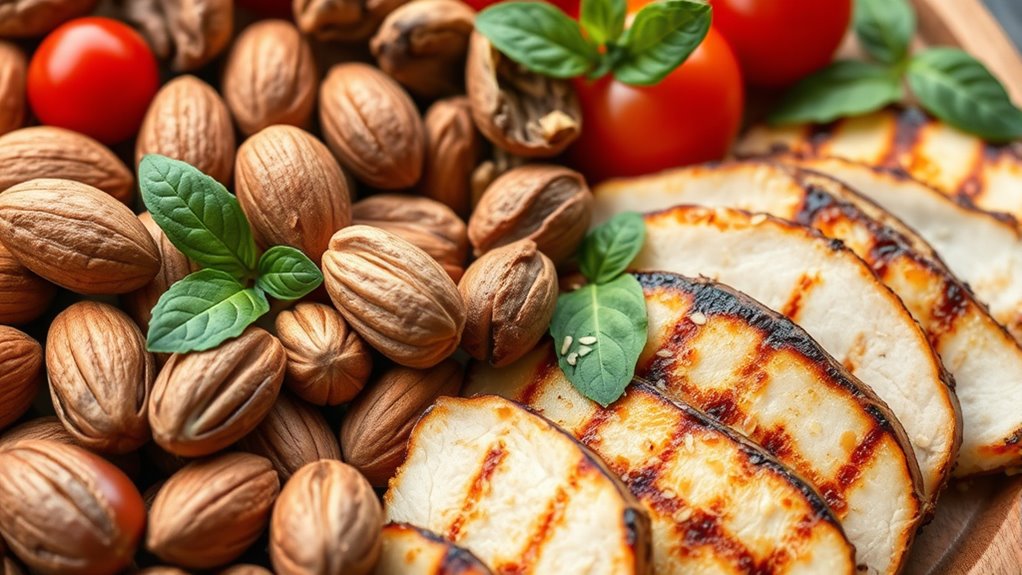
Nuts and lean proteins pack essential minerals and amino acids that strengthen your enamel and support healthy gums. Eating these foods encourages saliva flow, which helps protect your teeth from decay. Maintaining a balanced diet with appropriate nutritional content can further enhance your dental health. Incorporating a variety of these foods can also contribute to overall nutritional balance, benefiting your oral and general well-being.
Nutrient-Rich Support
Since nutrients like magnesium, calcium, and phosphorus are essential for strengthening tooth enamel, incorporating foods rich in these minerals can markedly boost your oral health. Nut and lean protein sources provide a nutrient-rich foundation to support resilient teeth and healthy gums. Here’s how they help:
- Nuts like almonds and cashews supply calcium, magnesium, and phosphorus, which work together to remineralize enamel and prevent decay.
- Lean proteins such as chicken, turkey, and eggs offer amino acids that promote tissue repair and maintain healthy gums.
- Folic acid in certain nuts and meats reduces gum inflammation and supports periodontal health.
- Phosphorus synergizes with calcium to strengthen enamel and protect against cavities.
Adding these foods to your diet can sustain your oral health and keep your teeth strong. Additionally, incorporating dental mineralization practices can further enhance your enamel strength and overall oral well-being.
Enamel and Gum Strength
Eating nuts like almonds and cashews, along with lean proteins such as chicken, turkey, and fish, directly benefits your teeth and gums by supplying essential minerals and amino acids. These nutrients strengthen your enamel, making it more resistant to decay and erosion.
The high calcium, magnesium, and phosphorus levels in nuts and lean meats promote remineralization, helping maintain the integrity of your enamel. Additionally, nutrients like folic acid support healthy gum tissue and can reduce inflammation associated with gum disease.
Consuming these foods regularly helps ensure your enamel stays strong and your gums remain healthy, reducing the risk of infections. Incorporating a variety of nutrient-dense snacks into your diet is a simple yet effective way to boost your oral health from the inside out.
How Chewing Sugar-Free Gum Supports Oral Hygiene
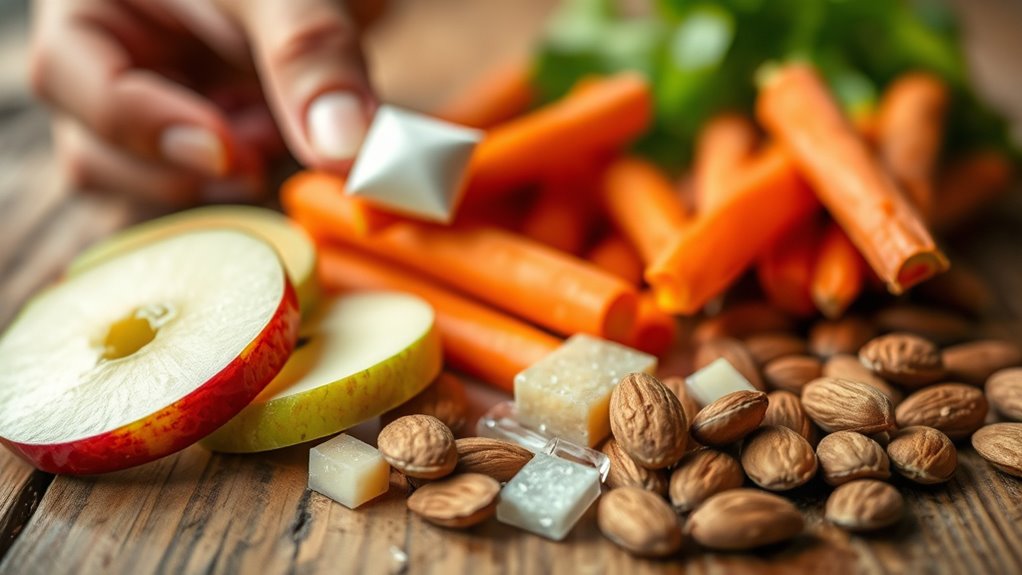
Chewing sugar-free gum helps keep your mouth clean by increasing saliva flow, which neutralizes acids and washes away food particles. Xylitol, a common ingredient, fights cavity-causing bacteria and reduces plaque buildup. Additionally, choosing a gum with high color accuracy can make your teeth appear whiter and healthier. Regular use of sugar-free gum has also been associated with a reduction in the risk of developing dental caries, supporting overall oral health. Incorporating preventive oral care habits like chewing gum can further enhance your dental hygiene routine.
Xylitol’s Cavity-Fighting Role
Have you ever wondered how sugar-free gum can help protect your teeth? Xylitol, a natural sugar substitute, plays a key role in fighting cavities and improving oral health.
When you chew gum with xylitol:
- It inhibits the growth of cavity-causing bacteria.
- It boosts saliva production, which neutralizes acids and helps remineralize enamel.
- It reduces plaque buildup, lowering your risk of cavities.
- Its antimicrobial properties support overall oral hygiene without the negative effects of sugar.
- Additionally, real couples often share routines that include good oral hygiene practices, emphasizing the importance of consistent dental care for maintaining strong teeth.
- Incorporating xylitol-containing gum into your routine can enhance oral health by providing ongoing protection between brushings, especially when combined with other preventive dental measures.
- Regular use of xylitol gum can also stimulate salivary flow, which is essential for natural cleansing and maintaining a healthy oral environment.
Stimulates Saliva Production
When you chew sugar-free gum, your salivary glands kick into high gear, producing up to ten times more saliva than usual. This boost in saliva production helps neutralize acids in your mouth, lowering the risk of enamel erosion and cavities. The increased saliva flow also washes away leftover food particles and bacteria, supporting oral cleanliness. Plus, ingredients like xylitol in sugar-free gum further promote saliva secretion and inhibit cavity-causing bacteria. Regularly chewing gum after meals keeps your mouth moist and helps maintain a healthy oral environment. Additionally, understanding how saliva composition contributes to oral health can further motivate consistent gum chewing habits. Maintaining proper oral pH balance is essential for preventing decay, and increased saliva helps to stabilize this environment naturally. The enzymes in saliva also play a vital role in breaking down food particles and protecting your teeth from decay. Moreover, staying hydrated enhances saliva production, which is crucial for overall oral health.
Foods to Limit or Avoid for Better Dental Care
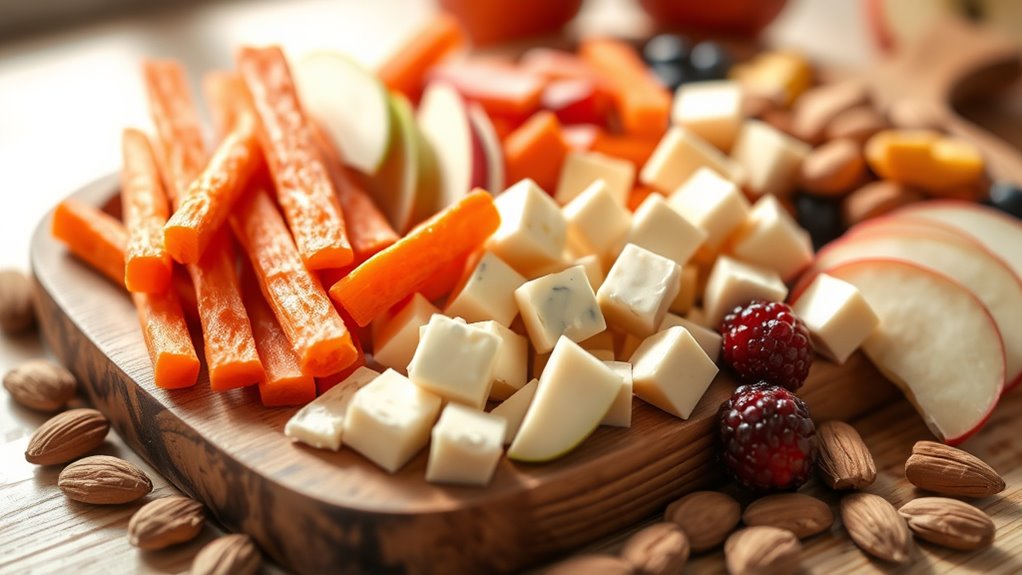
To protect your teeth, it’s important to limit or avoid foods that can cause damage. Sugary foods like candies, cookies, and desserts feed harmful bacteria, increasing acid production that erodes enamel.
Sticky snacks such as caramel and dried fruit cling to teeth longer, promoting plaque buildup and cavities.
Acidic foods and drinks like citrus fruits and fruit juices weaken tooth enamel, making teeth more vulnerable to decay.
Also, chips, pretzels, and crackers contain refined starches that turn into sugars in your mouth, fueling bacteria. Salivary flow plays a crucial role in neutralizing acids and washing away food particles, so staying hydrated helps support oral health. Additionally, automation in business can streamline dental care routines by providing personalized recommendations for oral hygiene products and schedules.
Certain brewing techniques can influence the flavor and texture of foods and drinks, but they are not directly related to dental health. Maintaining a proper balance of oral hygiene practices is essential to counteract the effects of these foods.
To keep your smile healthy, watch out for:
- Sugary foods
- Sticky snacks
- Acidic foods
- Refined starches
Limiting these helps prevent cavities, erosion, and long-term damage. Proper oral hygiene is essential when consuming these foods. Additionally, dental health can be supported by choosing snacks that are less likely to cause harm and incorporating good brushing and flossing habits.
Smart Snacking Habits to Prevent Cavities

Smart snacking habits play an essential role in preventing cavities by minimizing the time harmful bacteria have to produce acids that damage your teeth. To develop healthy habits, choose snacks that aren’t sticky or chewy, as they stay in contact with your teeth longer and increase cavity risk. Limiting sugary treats between meals is crucial, as prolonged exposure to sugar feeds bacteria and promotes acid production. If you do indulge, eating sweets immediately after a meal helps neutralize acids and dilutes sugar contact. Always brush with fluoride toothpaste after snacking to remove residual sugars and prevent plaque buildup. Additionally, scheduling regular dental checkups ensures early detection of any issues caused by snack choices. Incorporating glycolic acid into your skincare routine can also help maintain healthy skin around your mouth, reducing irritation that might compromise oral health. Practicing good oral hygiene habits and staying hydrated can further support your dental health. Consuming a balanced diet rich in nutrients essential for teeth provides the necessary minerals and vitamins that strengthen enamel and support overall oral health. Maintaining a balanced diet and being mindful of your overall dietary choices can significantly impact the strength of your teeth. By adopting these habits, you actively support stronger teeth and healthier smiles.
Incorporating Tooth-Friendly Snacks Into Your Routine
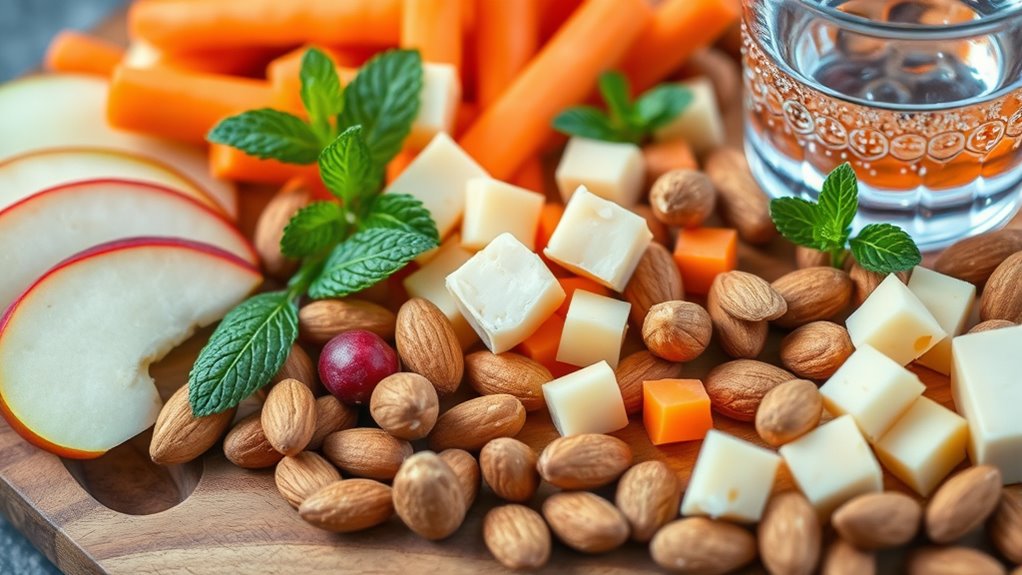
Incorporating tooth-friendly snacks into your daily routine is an effective way to support oral health. Choosing healthy snacks that promote strong teeth can make a big difference. Here are some ways to do it:
- Snack on crunchy vegetables like carrots and celery, which naturally clean teeth and stimulate saliva. Saliva production helps wash away food particles and neutralize acids in the mouth. Incorporating foods with advanced technology and design can also help maintain oral health by reducing plaque buildup.
- Opt for dairy options such as cheese and yogurt that supply calcium and boost oral health without excess sugar.
- Include fresh fruits like apples and pears, which hydrate and help remove plaque with their fibrous texture.
- After meals, chew sugar-free gum containing xylitol to increase saliva flow and neutralize acids.
Encouraging good oral habits can further enhance the benefits of tooth-friendly snacks.
Professional Dental Support for Maintaining a Healthy Smile
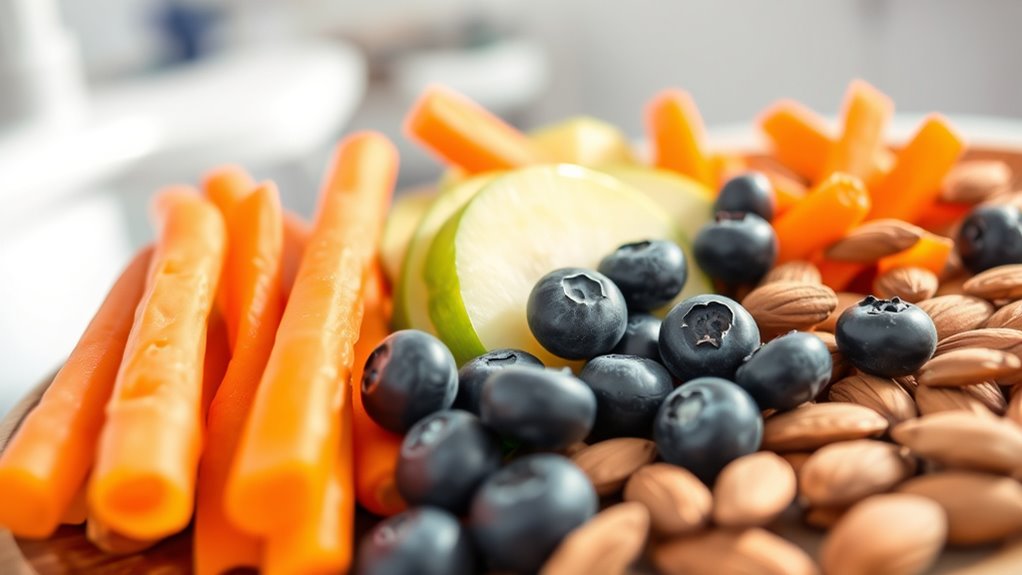
Regular dental visits play a crucial role in maintaining a healthy smile by catching issues early and preventing more serious problems. With professional dental support, you can prevent tooth decay through routine checkups and cleanings that identify early signs of cavities.
Regular dental visits are essential for early problem detection and maintaining a healthy, bright smile.
Dentists also offer personalized nutritional counseling, guiding you to choose tooth-friendly foods and avoid harmful snacks. They apply preventative treatments like fluoride varnishes and sealants that strengthen enamel and reduce decay risk.
Additionally, regular visits allow your dentist to monitor gum health and address issues like gingivitis before they worsen. Scheduling consistent appointments with dental professionals supports your long-term oral health, helping you maintain a bright, strong smile.
Research shows that dental care practices significantly contribute to overall oral health and cavity prevention. Trusting expert support ensures you stay proactive in your dental care journey.
Frequently Asked Questions
What Snacks Are Best for Your Teeth?
When choosing snacks for your teeth, focus on options that naturally clean and strengthen them. Crunchy fruits and vegetables like apples, carrots, and celery help scrub away plaque and boost saliva flow.
Unsweetened dairy products such as cheese and yogurt supply calcium to reinforce enamel. Nuts provide essential minerals, while whole grains and lean proteins support overall oral health.
Avoid sticky, sugary snacks, and drink plenty of water to keep your mouth healthy.
What to Eat for Strong Teeth?
Imagine building a fortress around your smile—what you eat can be your strongest weapon. To keep your teeth resilient, choose dairy like cheese and yogurt for calcium power, crunchy veggies like carrots to scrub away plaque, and crisp fruits like apples to boost saliva. Nuts and lean proteins fuel your defenses, while water washes away acids. These choices work together to strengthen your teeth, making your smile a shining shield of health.
What Are the Best Foods for Teeth Repair?
When it comes to teeth repair, you should focus on foods that supply essential minerals. Incorporate dairy products and leafy greens for calcium, which strengthens enamel.
Eat nuts, lean meats, and fish rich in phosphorus to rebuild tooth structures.
Chew fibrous fruits and vegetables to boost saliva production, helping remineralize enamel naturally.
Additionally, include fluoride-rich seafood and canned veggies to enhance remineralization and protect against acid erosion.
Avoid sugary and acidic foods to prevent further damage.
What Foods Help Loosen Teeth?
Like Pandora’s box, some foods can unexpectedly loosen your teeth. You might notice that sticky, chewy candies, or hard items like ice, put excessive pressure on your teeth.
Chewing tough or fibrous foods can strain weakened structures, and sugary snacks promote gum inflammation, weakening support tissues.
These foods act like silent saboteurs, gradually loosening teeth by damaging the periodontal ligament or aggravating existing dental vulnerabilities.
Conclusion
By choosing tooth-friendly snacks and adopting smart habits, you set yourself up for a lifetime of healthy smiles. Remember, it’s better to nip dental issues in the bud than to deal with more serious problems later. Keep your teeth strong and gums happy by staying consistent and making good choices—because an ounce of prevention is worth a pound of cure. Your smile will thank you for it!









